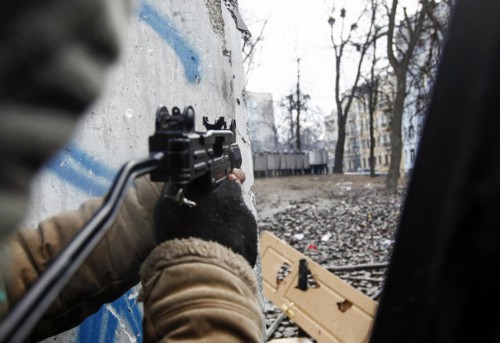mardi, 25 juillet 2023
La persécution des Orthodoxes ukrainiens passée sous silence
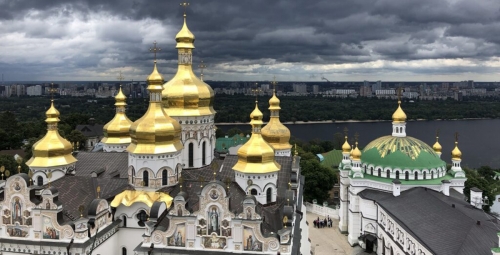
La persécution des Orthodoxes ukrainiens passée sous silence
Source: https://zurzeit.at/index.php/die-verschwiegene-christenverfolgung-in-der-ukraine/?fbclid=IwAR1vMCQsWkgDWaOKiCBhB4xQLJPvUnR0ZSUlZWOY9skmAAn-oyhU-ijH958
Bernard Tomaschitz
Une conférence de haut niveau du Centre d'études géostratégiques consacrée à un sujet hautement explosif
L'Union européenne ne cesse d'affirmer que son soutien, y compris militaire, à l'Ukraine a pour but de défendre les "valeurs" européennes. En réalité, le régime de Zelenski bafoue les droits de l'homme fondamentaux, en particulier lorsqu'il s'agit de Russes de nationalité ukrainienne. L'Église orthodoxe ukrainienne, à ne pas confondre avec l'Église orthodoxe d'Ukraine, fidèle à Zelenski et placée sous l'égide du Patriarcat de Constantinople, est particulièrement touchée par ce phénomène. L'Église orthodoxe ukrainienne fait l'objet de nombreuses formes de persécution, notamment l'occupation violente de l'un des plus anciens centres du monde orthodoxe, le monastère troglodytique de Kiev (photo, ci-dessus).
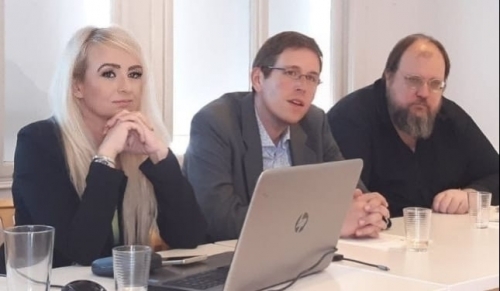
Alors que les médias occidentaux restent muets sur ces graves violations des droits de l'homme, la section autrichienne du Centre d'études géostratégiques a organisé le 22 juillet à Vienne une conférence sur les violations des droits religieux, avec un accent particulier sur l'Église orthodoxe ukrainienne dans le contexte des événements actuels.
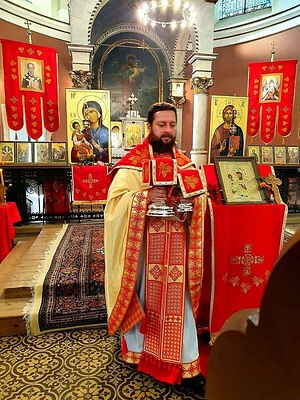
L'archiprêtre Slađan Vasić (photo, ci-dessus) a estimé que, du point de vue du droit canonique, l'Église orthodoxe ukrainienne est la seule Église orthodoxe régulière en Ukraine, dont l'existence ne peut être contestée. Cependant, il y aurait des "preuves de génocide", de "destruction ukrainienne de l'Eglise orthodoxe", a expliqué Daniel Kovalik. Ce professeur de droit humanitaire américain s'est récemment rendu dans le Donbass et a fait état d'églises et de monastères dans cette région qui ont été et sont toujours attaqués par l'armée ukrainienne. Il pense que le gros problème est que les médias mondiaux ignorent ces faits qui sont documentés : "La guerre contre les Russes ethniques, la population russophone et les fidèles de l'Eglise sous l'égide du Patriarcat de Moscou se poursuit depuis 2014 et je pense que nous pouvons la qualifier de génocide".
L'archiprêtre Paisius voit également une persécution de l'Église en Ukraine a fait référence à l'histoire des Balkans et à ce qui s'y est passé en Bosnie-Herzégovine, au Kosovo et à Metohija, etc.
Dragana Trifković, directrice du Centre d'études géostratégiques de Serbie, a placé la persécution de l'Église orthodoxe ukrainienne dans un contexte géopolitique : pour que l'OTAN puisse contrôler l'Ukraine, les centres de pouvoir mondialistes, c'est-à-dire les États-Unis, tentent d'approfondir les schismes dans l'ensemble du monde orthodoxe et le patriarche œcuménique Bartholomée [de Constantinople] les y aide beaucoup. Et Mme Trifković a également fait référence aux Balkans : "Comme exemple de la destruction de l'orthodoxie par les centres de pouvoir mondialistes, je voudrais citer le fait qu'au Kosovo et en Metohija, plus de 150 églises et monastères serbes datant du Moyen-Âge ont été détruits par des terroristes albanais lorsque l'OTAN a pris le contrôle de cette région".
Vous pouvez lire le rapport complet de cette conférence en anglais sur :
18:09 Publié dans Actualité, Affaires européennes | Lien permanent | Commentaires (0) | Tags : actualité, europe, affaires européennes, ukraine, orthodoxie, église orthodoxe d'ukraine, kiev |  |
|  del.icio.us |
del.icio.us |  |
|  Digg |
Digg | ![]() Facebook
Facebook
vendredi, 18 mars 2022
Sur le rôle des églises orthodoxes dans le conflit ukrainien
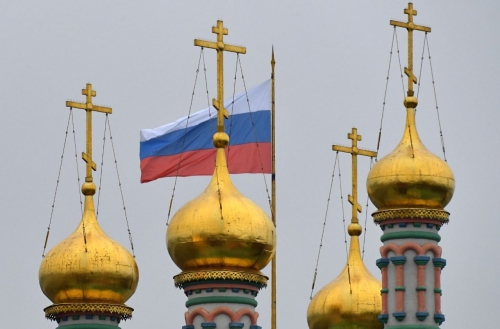
Sur le rôle des églises orthodoxes dans le conflit ukrainien
Erich Körner-Lakatos
Source: https://zurzeit.at/index.php/ueber-die-rolle-der-orthodoxen-kirchen-im-ukraine-konflikt/
Le Patriarcat de Moscou se retrouve presque seul
Les relations entre les différentes églises chrétiennes orthodoxes, qui ne sont pas dénuées de conflits, ont encore été exacerbées par l'invasion russe du pays voisin occidental. Jusqu'à présent, il y avait les querelles bien connues entre le chef honorifique à Constantinople (Istanbul), le patriarche œcuménique Bartholomée Ier, largement impuissant mais respecté en tant que primus inter pares, d'une part, et les différentes églises nationales autocéphales, donc pratiquement indépendantes, d'autre part.
Cyrille Ier, le patriarche de "Moscou et de toute la Rus", a toujours revendiqué la primauté de la Troisième Rome. Ces derniers temps, on a également entendu parler de querelles entre les orthodoxes de Serbie et l'Église orthodoxe monténégrine reconstituée, rattachée auparavant au royaume indépendant jusqu'en 1918, où il est également question de choses très séculières, à savoir la propriété des bâtiments religieux. Il en va de même pour le conflit entre le patriarche orthodoxe serbe de Belgrade et la jeune Église orthodoxe macédonienne.
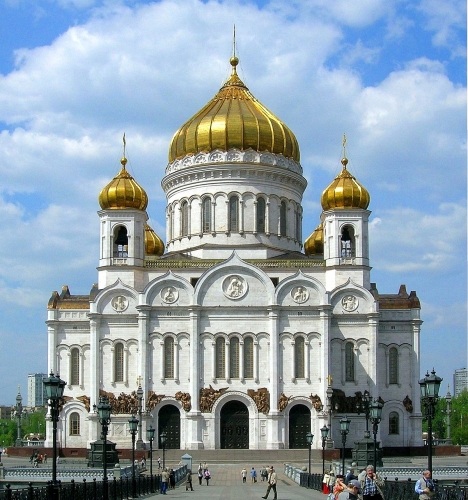
Dans la tradition de l'alliance entre le trône et l'autel qui existe depuis l'époque des tsars, le chef de l'Eglise moscovite Cyrille Ier est entièrement du côté de son ami Vladimir Poutine, qui se présente comme un chrétien fervent, ce qui est toutefois difficile à croire pour un agent du KGB. Il convient de noter que la mère de Poutine a fait baptiser le petit Vladimir en secret. L'Église orthodoxe russe bénéficie d'une aide financière considérable de l'État pour la (re)construction d'églises et de monastères. Le prince de l'Eglise et le président ont en commun leur aversion pour l'Occident, qu'ils considèrent comme décadent. Cela s'est traduit par exemple par la persécution sévère du groupe Pussy Riots (en français : "émeutes des chattes") par l'État. Pour leur apparition peu ragoûtante dans la cathédrale du Christ-Sauveur de Moscou le 21 février 2012, ces "dames" seront jugées par le tribunal pénal. Poutine et le patriarche en sont très satisfaits.
De l'autre côté, l'Église gréco-catholique ukrainienne, qui s'appuie sur un grand nombre de fidèles (plus de quatre millions) dans l'ouest de l'Ukraine, avec à sa tête l'archevêque majeur de Kiev, Sviatoslav Shevchuk. Il s'agit d'une communauté religieuse à mi-chemin entre le catholicisme latin et l'orthodoxie. Depuis 1596 (en vertu de l'Union de Brest), elle reconnaît le Saint-Père de Rome comme chef de l'Église et se considère comme faisant partie de l'Église catholique. Persécutés à l'époque par Staline, ces "Uniates" célèbrent la liturgie selon le rite byzantin (ritus graecus) et défendent sans réserve une Ukraine indépendante.
Il en va de même pour l'Eglise orthodoxe ukrainienne, qui s'est détachée du Patriarcat de Moscou, se considère comme une Eglise autocéphale et est reconnue comme telle par le Patriarche œcuménique. Elle proteste contre l'invasion du pays. Ensuite, il existe encore en Ukraine une église orthodoxe qui reconnaît le patriarche de Moscou comme son chef. Pour elle, une prise de position s'avère particulièrement délicate, car elle est assise entre deux chaises - ses fidèles ukrainiens et la hiérarchie. Quelle est sa décision ? Très clairement, elle se positionne contre l'invasion. Il en résulte un rapprochement surprenant avec la branche autocéphale, avec laquelle elle se disputait jusqu'ici pour réunir des fidèles et pour gérer les biens de l'Église.
13:55 Publié dans Actualité, Affaires européennes | Lien permanent | Commentaires (0) | Tags : europe, russie, affaires européennes, ukraine, uniates, églises orthodoxes, orthodoxie, église autocéphales, kiev, moscou |  |
|  del.icio.us |
del.icio.us |  |
|  Digg |
Digg | ![]() Facebook
Facebook
jeudi, 30 janvier 2014
"United by Hatred"
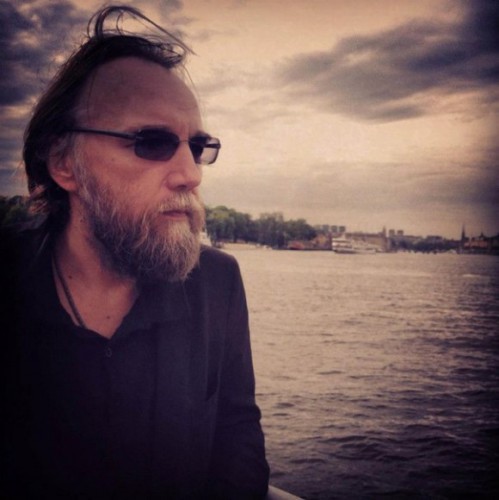
"United by Hatred"
Interview with Alexander Dugin
by Manuel Ochsenreiter
Ex: http://manuelochsenreiter.com
Prof. Dugin, the Western mainstream media and established politicians describe the recent situation in Ukraine as a conflict between pro-European, democratic and liberal oppositional alliance on the one side and an authoritarian regime with a dictator as president on the other side. Do you agree?
Dugin: I know those stories and I consider this type of analysis totally wrong. We cannot divide the world today in the Cold War style. There is no “democratic world” which stands against an “antidemocratic world”, as many Western media report.
Your country, Russia, is one of the cores of this so called “antidemocratic world” when we believe our mainstream media. And Russia with president Vladimir Putin tries to intervene in Ukrainian domestic politics, we read...
Dugin: That´s completely wrong. Russia is a liberal democracy. Take a look at the Russian constitution: We have a democratic electoral system, a functioning parliament, a free market system. The constitution is based on Western pattern. Our president Vladimir Putin rules the country in a democratic way. We are a not a monarchy, we are not a dictatorship, we are not a soviet communist regime.
Our politicians in Germany call Putin a “dictator”!
Dugin: (laughs) On what basis?
Because of his LGBT-laws, his support for Syria, the law suits against Michail Chodorchowski and “Pussy Riot”...
Dugin: So they call him “dictator” because they don´t like the Russian mentality. Every point you mentioned is completely democratically legitimate. There is not just one single “authoritarian” element. So we shouldn´t mix that: Even if you don´t like Russia´s politics you can´t deny that Russia is a liberal democracy. President Vladimir Putin accepts the democratic rules of our system and respects them. He never violated one single law. So Russia is part of the liberal democratic camp and the Cold War pattern doesn´t work to explain the Ukrainian crisis.
Violent protesters in Kiev
So how can we describe this violent and bloody conflict?
Dugin: We need a very clear geopolitical and civilizational analysis. And we have to accept historical facts, even if they are in these days not en vogue!
What do you mean?
Dugin: Todays Ukraine is a state which never existed in history. It is a newly created entity. This entity has at least two completely different parts. These two parts have a different identity and culture. There is Western Ukraine which is united in its Eastern European identity. The vast majority of the people living in Western Ukraine consider themselves as Eastern Europeans. And this identity is based on the complete rejection of any pan-Slavic idea together with Russia. Russians are regarded as existential enemies. We can say it like that: They hate Russians, Russian culture and of course Russian politics. This makes an important part of their identity.
You are not upset about this as a Russian?
Dugin: (laughs) Not at all! It is a part of identity. It doesn´t necessarily mean they want to go on war against us, but they don´t like us. We should respect this. Look, the Americans are hated by much more people and they accept it also. So when the Western Ukrainians hate us, it is neither bad nor good – it is a fact. Let´s simply accept this. Not everybody has to love us!
But the Eastern Ukrainians like you Russians more!
Dugin: Not so fast! The majority of people living in the Eastern part of Ukraine share a common identity with Russian people – historical, civilizational, and geopolitical. Eastern Ukraine is an absolute Russian and Eurasian country. So there are two Ukraines. We see this very clear at the elections. The population is split in any important political question. And especially when it comes to the relations with Russia, we witness how dramatic this problem becomes: One part is absolute anti-Russian, the other Part absolute pro-Russian. Two different societies, two different countries and two different national, historical identities live in one entity.
So the question is which society dominates the other?
Dugin: That´s an important part of Ukrainian politics. We have the two parts and we have the capital Kiev. But in Kiev we have both identities. It is neither the capital of Western Ukraine nor Eastern Ukraine. The capital of the Western part is Lviv, the capital of the Eastern part is Kharkiv. Kiev is the capital of an artificial entity. These are all important facts to understand this conflict.
Western Media as well as Ukrainian “nationalists” would strongly disagree with the term “artificial” for the Ukrainian state.
Dugin: The facts are clear. The creation of the state of Ukraine within the borders of today wasn´t the result of a historical development. It was a bureaucratic and administrative decision by the Soviet Union. The Ukrainian Soviet Socialist Republic was one of the 15 constituent republics of the Soviet Union from its inception in 1922 to its end in 1991. Throughout this 72-year history, the republic's borders changed many times, with a significant part of what is now Western Ukraine being annexed by the Red Army in 1939 and the addition of formerly Russian Crimea in 1954.
Some politicians and analysts say that the easiest solution would be the partition of Ukraine to an Eastern and a Western state.
Dugin: It is not as easy as it might sound because we would get problems with national minorities. In the Western part of Ukraine many people who consider themselves as Russians live today. In the Eastern part lives a part of the population that considers itself as Western Ukrainian. You see: A simple partition of the state wouldn´t really solve the problem but even create a new one. We can imagine the Crimean separation, because that part of Ukraine is purely Russian populated territory.
Why does it seem that the European Union is so much interested in “importing” all those problems to its sphere?
Dugin: It is not in the interest of any European alliance, it is in the interest of USA. It is a political campaign which is led against Russia. The invitation of Brussels to Ukraine to join the West brought immediately the conflict with Moscow and the inner conflict of Ukraine. This is not surprising at all of anybody who knows about the Ukrainian society and history.
Some German politicians said that they were surprised by the civil war scenes in Kiev...
Dugin: This says more about the standards of political and historical education of your politicians than about the crisis in Ukraine...
But the Ukrainian president Viktor Yanukovych refused the invitation of the West.
Dugin: Of course he did. He was elected by the pro-Russian East and not by the West. Yanukovych can´t act against the interest and the will of his personal electoral base. If he would accept the Western-EU-invitation he would be immediately a traitor in the eyes of his voters. Yanukovych´s supporters want integration with Russia. To say it clearly: Yanukovych simply did what was very logical for him to do. No surprise, no miracle. Simply logical politics.
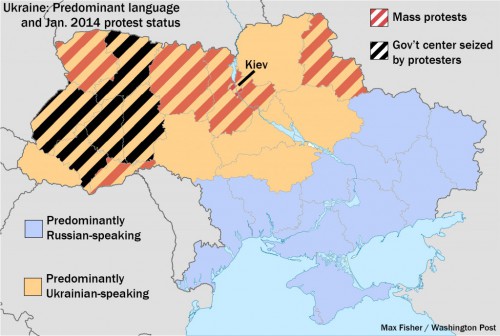
There is now a very pluralistic and political colorful oppositional alliance against Yanukovych: This alliance includes typical liberals, anarchists, communists, gay right groups and also nationalist and even neo-Nazi groups and hooligans. What keeps these different groups and ideologies together?
Dugin: They are united by their pure hatred against Russia. Yanukovych is in their eyes the proxy of Russia, the friend of Putin, the man of the East. They hate everything what has to do with Russia. This hate keeps them together; this is a block of hatred. To say it clearly: Hate is their political ideology. They don´t love the EU or Brussels.
What are the main groups? Who is dominating the oppositional actions?
Dugin: These are clearly the most violent neo-Nazi groups on the so called Euro-Maidan. They push for violence and provoke a civil war situation in Kiev.
Western Mainstream media claims that the role of those extremist groups is dramatized by the pro-Russian media to defame the whole oppositional alliance.
Dugin: Of course they do. How do they want to justify that the EU and the European governments support extremist, racist, neo-Nazis outside the EU-borders while they do inside the EU melodramatic and expensive actions even against the most moderate right wing groups?
But how can for example the gay right groups and the left wing liberal groups fight alongside the neo-Nazis who are well known to be not really very gay friendly?
Dugin: First of all, all these groups hate Russia and the Russian president. This hate makes them comrades. And the left wing liberal groups are not less extremist than the neo-Nazi groups. We tend to think that they are liberal, but this is horribly wrong. We find especially in Eastern Europe and Russia very often that the Homosexual-Lobby and the ultranationalist and neo-Nazi groups are allies. Also the Homosexual lobby has very extremist ideas about how to deform, re-educate and influence the society. We shouldn´t forget this. The gay and lesbian lobby is not less dangerous for any society than neo-Nazis.
We know such an alliance also from Moscow. The liberal blogger and candidate for the mayoral position in Moscow Alexej Nawalny was supported by such an alliance of gay rights organizations and neo-Nazi groups.
Dugin: Exactly. And this Nawalny-coalition was also supported by the West. The point is, it is not at all about the ideological content of those groups. This is not interesting for the West.
What do you mean?
Dugin: What would happen if a neo-Nazi organization supported Putin in Russia or Yanukovych in Ukraine?
The EU would start a political campaign; all huge western mainstream media would cover this and scandalize that.
Dugin: Exactly that´s the case. So it is only about on which side such a group stands. If the group is against Putin, against Yanukovych, against Russia, the ideology of that group is not a problem. If that group supports Putin, Russia or Yanukovych, the ideology immediately becomes a huge problem. It is all about the geopolitical side the group takes. It is nothing but geopolitics. It is a very good lesson what is going on in Ukraine. The lesson tells us: Geopolitics is dominating those conflicts and nothing else. We witness this also with other conflicts for example in Syria, Libya, Egypt, in Caucasian region, Iraq, Iran...
Any group taking side in favor of the West is a “good” group with no respect if it is extremist?
Dugin: Yes and any group taking side against the West – even if this group is secular and moderate – will be called “extremist” by the Western propaganda. This approach exactly dominates the geopolitical battlefields today. You can be the most radical and brutal Salafi fighter, you can hate Jews and eat human organs in front of a camera, as long as you fight for the Western interest against the Syrian government you are a respected and supported ally of the West. When you defend a multi-religious, secular and moderate society, all ideals of the West by the way, but you take position against the Western interest like the Syrian government, you are the enemy. Nobody is interested in what you believe in, it is only about the geopolitical side you chose if you are right or wrong in the eyes of the Western hegemon.
Prof. Dugin, especially Ukrainian opposition groups calling themselves “nationalists” would strongly disagree with you. They claim: “We are against Russia and against the EU, we take a third position!” The same thing ironically also the salafi fighter in Syria would say: “We hate Americans as much as the Syrian government!” Is there something like a possible third position in this geopolitical war of today?
Dugin: The idea to take a third and independent position between the two dominating blocks is very common. I had some interesting interviews and talks with a leading figure of the Chechen separatist guerilla. He confessed to me that he really believed in the possibility of an independent and free Islamic Chechnya. But later he understood that there is no “third position”, no possibility of that. He understood that he fights against Russia on the side of the West. He was a geopolitical instrument of the West, a NATO proxy on the Caucasian battlefield. The same ugly truth hits the Ukrainian “nationalist” and the Arab salafi fighter: They are Western proxies. It is hard to accept for them because nobody likes the idea to be the useful idiot of Washington.
To say it clearly: The “third position” is absolutely impossible?
Dugin: No way for that today. There is land power and sea power in geopolitics. Land power is represented today by Russia, sea power by Washington. During World War II Germany tried to impose a third position. This attempt was based precisely on those political errors we talk about right now. Germany went on war against the sea power represented by the British Empire, and against the land power represented by Russia. Berlin fought against the main global forces and lost that war. The end was the complete destruction of Germany. So when even the strong and powerful Germany of that time wasn´t strong enough to impose the third position how the much smaller and weaker groups want to do this today? It is impossible, it is a ridiculous illusion.
Anybody who claims today to fight for an independent “third position” is in reality a proxy of the West?
Dugin: In most of the cases, yes.
Former German foreign minister Guido Westerwelle shows solidarity with the "Euro-Maidan"
Moscow seems to be very passive. Russia doesn´t support any proxies for example in the EU countries. Why?
Dugin: Russia doesn´t have an imperialist agenda. Moscow respects sovereignty and wouldn´t interfere in the domestic politics of any other country. And it is an honest and good politics. We witness this even in Ukraine. We see much more EU-politicians and even US-politicians and diplomats travelling to Kiev to support the opposition than we see Russian politicians supporting Yanukovych in Ukraine. We shouldn´t forget that Russia doesn´t have any hegemonial interests in Europe, but the Americans have. Frankly speaking, the European Union is not a genuine European entity – it is an imperialist transatlantic project. It doesn´t serve the interests of the Europeans but the interests of the Washington administration. The “European Union” is in reality anti-European. And the “Euro-Maidan” is in reality “anti-Euro-Maidan”. The violent neo-Nazis in Ukraine are neither “nationalist” nor “patriotic” nor “European” - they are purely American proxies. The same for the homosexual rights groups and organizations like FEMEN or left wing liberal protest groups.
09:33 Publié dans Actualité, Affaires européennes, Entretiens, Nouvelle Droite | Lien permanent | Commentaires (0) | Tags : nouvelle droite, nouvelle droite russe, alexandre douguine, entretien, géopolitique, politique internationale, russie, ukraine, europe, affaires européennes, kiev, actualité |  |
|  del.icio.us |
del.icio.us |  |
|  Digg |
Digg | ![]() Facebook
Facebook
jeudi, 23 janvier 2014
Francotiradores no identificados disparan contra manifestantes en Kiev
Ex: http://www.elespiadigital.com/
Manifestantes han muerto en el centro de Kiev por heridas de bala, según han informado varios medios locales, aunque la policía ucraniana negó que haya empleado armas de fuego en los enfrentamientos que prosiguen desde el domingo pasado. La agencia Liga.Novosti informó -citando a la oposición- que las personas resultaron muertas por disparos de francotiradores ocultos en la calle Grushevski, junto a la sede del Gobierno y escenario de los últimos enfrentamientos. El portavoz del Ministerio del Interior, Serguei Burlakov, ha asegurado que no se puede responsabilizar a la Policía por la muerte de los manifestantes dado que no portan armas de fuego.
La “oposición” de Ucrania amenazó con "atacar" si no se cumplían sus exigencias
Líderes de la oposición ucraniana amenazaron con "pasar a la ofensiva" si el presidente Víktor Yanukóvich no cumple con sus exigencias. "Si el presidente no responde mañana, vamos a pasar a la ofensiva", declaró uno de los líderes opositores, el exboxeador ultra Vitali Klitschko. La violencia la tenían planificada…
Además, el que se ha convertido en una de las cabezas visibles más populares de la oposición instó a los manifestantes a quedarse en el centro de Kiev, defender la plaza de la Independencia (Maidán) y prepararse para una ofensiva policial en su contra.
Otro político opositor ucraniano, Arseni Yatsenyuk, dio a Yanukóvich un ultimátum de 24 horas para responder a sus peticiones.
Una ola de violencia provocada por una nueva “red Gladio” que agrupa a unos dos mil agitadores
Las protestas que sacuden Ucrania desde el pasado noviembre entraron en una fase violenta. El Parlamento endureció las sanciones antidisturbios, mientras que los enfrentamientos entre los manifestantes y la Policía se han cobrado víctimas mortales.
La noche del miércoles un grupo de desconocidos tomó el control de un edifico en la céntrica calle Kreschátik de la capital ucraniana, en el que se encuentra una oficina del canal de televisión municipal Kiev, informó el servicio de prensa del ayuntamiento citando a varios empleados de la cadena.
El número de heridos entre los agentes de seguridad durante los disturbios en Kiev ascendió a 218, según informó la página web del Ministerio del Interior de Ucrania. 99 de ellos tuvieron que ser hospitalizados con lesiones, fracturas, quemaduras, heridas de arma blanca o envenenamiento con sustancias desconocidas.
Los manifestantes construyeron una segunda línea de barricadas en la calle de Grushevski, cerca del hotel Dnepr. Mientras tanto, los neumáticos en llamas bloquean la misma calle en el tramo cercano al estadio del Dinamo de Kiev.
Los dos hombres que habían sido considerados muertos en la calle de Grushevski recibieron heridas de balas: una de calibre 7,62 milímetros de un rifle de francotirador Degtiariov, y otra de calibre 9 milímetros, presumiblemente de una pistola Makárov, informa la cadena Expreso.
Un hombre de 22 años que anteriormente fue declarado muerto por la oposición está vivo, informan los médicos de un hospital de la capital ucraniana. El joven se cayó desde lo alto de la columnata de 13 metros de altura que se encuentra próxima al estadio del Dinamo de Kiev.
La céntrica calle de Grushevski está cubierta de humo negro procedente de la quema de los neumáticos que los manifestantes han traído de todo Kiev. Según la agencia Unian, su objetivo es crear una cortina de humo que dificulte el asalto policial de Maidán, donde se concentran 2.000 personas.
Desalojos, secuestros y agresiones a la población civil por parte de los “manifestantes”
Un vehículo blindado de las fuerzas especiales desmanteló las barricadas de los violentos. Las autoridades de Kiev pidieron a quienes trabajen en el centro urbano que abandonen sus oficinas a las 16:00 (hora local).
Los manifestantes de Maidán se arman con mazas metálicas de fabricación casera. Los agentes de seguridad han encontrado casi 100 mazas en el edificio de la administración capitalina, que los protestantes tomaron durante cierto periodo de tiempo grupos ultras.
"En todos los disturbios en Kiev participan los mismos grupos radicales", afirma un comunicado del Ministerio del Interior ucraniano.
La Fiscalía General de Ucrania denuncia el secuestro de más de 50 personas durante la noche. Según revelan los testigos, los golpearon y llevaron a una dirección desconocida. Según la explicación ofrecida por los fiscales, estos hechos evidencian el crecimiento de la violencia por parte de los integrantes de las agrupaciones extremistas y otras respecto a las fuerzas del orden y la población civil.
La Policía de Kiev empezó a retirar las barricadas en el centro de la capital de Ucrania. A su vez, los manifestantes comenzaron a lanzar piedras y cócteles molotov contra los agentes, obligándoles a retirarse, aunque luego respondieron a los ataques con granadas aturdidoras. Posteriormente, las fuerzas especiales reanudaron el proceso de desmantelamiento.
El primer ministro de Ucrania, Nikolái Azárov, dijo a una cadena de televisión rusa que la información sobre el número de participantes de las protestas antigubernamentales ha sido exagerada por los medios. Por otro lado, la participación en el mitin de los detractores de la integración en la UE está minusvalorada. En el denominado 'Euromaidán', afirmó, "se han reunido tres provincias", mientras que "en el otro Maidán [conocido en la prensa local como 'Antimaidán'] está representada toda Ucrania".
Tres de los hospitalizados en Kiev han perdido un ojo en los enfrentamientos callejeros. A otro se le amputó una mano a consecuencia del traumatismo recibido. Los manifestantes usan palos con punta metálica que repartieron entre ellos los organizadores de la protesta.
"Esas varas son una arma blanca peligrosa que ellos están dispuestos a emplear para herir a los agentes de las fuerzas del orden", afirmó el comunicado difundido por el Departamento de Seguridad Pública de la Policía ucraniana.
Yanukovich llama al diálogo
El mandatario ucraniano pide a la oposición en un comunicado publicado en su página web que se siente a la mesa del diálogo. "Os pido que no respondáis a los llamamientos radicales, todavía no es tarde parar y arreglar el conflicto de forma pacífica", declaró el presidente ucraniano, Víktor Yanukóvich, en un mensaje a los manifestantes antigubernamentales en Kiev.
Injerencia occidental descarada apoyando a los grupos violentos
El Ministerio de Justicia de Ucrania ha expresado su preocupación por los diplomáticos extranjeros que visitan los edificios administrativos tomado por la oposición. "Los manifestantes están preparando cócteles molotov en esos edificios", dijo la ministra de Justicia, Yelena Lukash, llamando a los países europeos a condenar la violencia cometida por la oposición en Kiev.
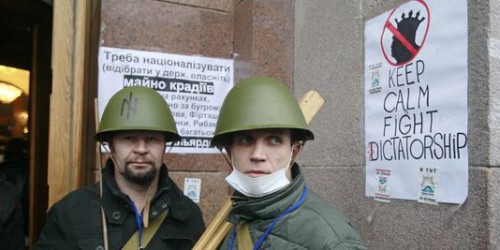 Las Fuerzas Armadas de Ucrania no participarán en los acontecimientos relacionados con las protestas en Kiev. "Todo el personal militar y todos los equipos se encuentran en sus lugares de emplazamiento permanente", dijo una fuente del Ministerio de Defensa de Ucrania a la agencia Interfax.
Las Fuerzas Armadas de Ucrania no participarán en los acontecimientos relacionados con las protestas en Kiev. "Todo el personal militar y todos los equipos se encuentran en sus lugares de emplazamiento permanente", dijo una fuente del Ministerio de Defensa de Ucrania a la agencia Interfax.
José Manuel Durão Barroso, presidente de la Comisión Europea, ha lamentado las víctimas mortales en Ucrania y ha pedido a las autoridades que tomen medidas para controlar la crisis. "Estamos conmocionados por la muerte de dos manifestantes y expresamos nuestras condolencias más profundas a sus familias. Pedimos a todas las partes que se abstengan del uso de la violencia", insistió.
La Embajada de EE.UU. en Ucrania advierte sobre la imposición de Washington de sanciones a quienes hayan usado fuerza contra los participantes de Euromaidán.
"Tenemos información de que todo esto se está estimulando principalmente desde el extranjero", dijo el ministro ruso de Asuntos Exteriores, Serguéi Lavrov, en referencia a las protestas que sacuden Ucrania. "Resulta que estos promotores ni siquiera tienen en cuenta los intereses de la propia oposición ucraniana, ya que intentan incitarla a la violencia".
"Quienes organizan los disturbios están violando todas las normas de comportamiento europeas", dijo el jefe de la diplomacia rusa. "Cuando algo semejante suceda en los países de la Unión Europea, nadie pondrá en duda la necesidad de medidas duras para detener la violencia y los disturbios", agregó Lavrov.
En el mismo sentido se expresó nuestro redactor Gustavo Morales en declaraciones a Rusia Today: http://actualidad.rt.com/video/actualidad/view/117727-ucrania-injerencia-europa-gobierno-militar
El Ministerio de Asuntos Exteriores de Ucrania confirmó la detención en Kiev de un empleado de Radio Liberty que lanzaba "objetos prohibidos" a los agentes policiales. El trabajador de la emisora no se identificó como tal durante la detención ni llevaba distintivos, aseguran fuentes del ministerio.
10:10 Publié dans Actualité, Affaires européennes | Lien permanent | Commentaires (0) | Tags : politique internationale, actualité, europe, affaires européennes, kiev, ukraine, émeutes en ukraine |  |
|  del.icio.us |
del.icio.us |  |
|  Digg |
Digg | ![]() Facebook
Facebook



